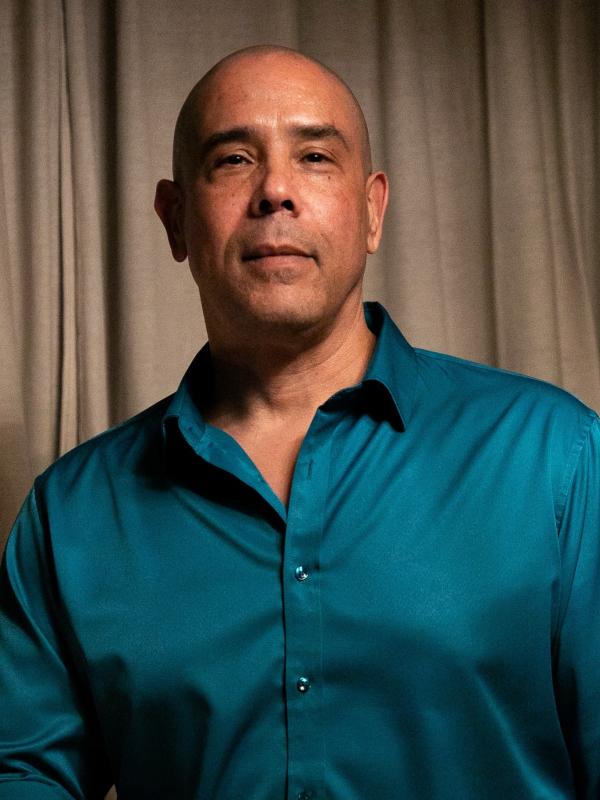Maurice Stevens

Contact Information
Professor; Associate Dean for Engagement, College of Arts and Sciences; and Faculty Director of the STEAM Factory
they/them
Areas of Expertise
- critical trauma theory
- critical and transformative pedagogy
- Intersectionality theory
- disability studies
- critical psychoanalysis
- affect and embodiment
- science and technology studies
Education
- Ph.D. in History of Consciousness, University of California, Santa Cruz
critical trauma theory, critical and transformative pedagogies, intersectionality theory, disability studies, affect and embodiment, performance theory, critical psychoanalysis, science and technology studies
Maurice Stevens is a Professor in the Department of Comparative Studies at the Ohio State University and an adjunct faculty member for the Pacifica Graduate Institute in the department of Depth Psychology’s Community, Liberation, Indigenous, and Eco-Psychologies Program. Dr. Stevens is also a writing coach for the National Center for Faculty Development and Diversity. Stevens received their B.A. in Religion and Anthropology from Princeton University and their M.A. and Ph.D. from the interdisciplinary History of Consciousness Department at the University of California, Santa Cruz.
Dr. Stevens teaches interdisciplinary cultural and technological studies theories and methods. Stevens’ research interests include critical trauma theory, critical and transformative pedagogies, intersectionality theory, disability studies, affect and embodiment, performance theory, critical psychoanalysis, and science and technology studies. Their most recent research has focused on the emergence and application of critical trauma theory in multiple clinical, social, organizational, and institutional contexts, and its development as a field. Dr. Stevens’ first book is titled Troubling Beginnings: Trans(per)forming African-American History and Identity, and they are currently working on a second book called Catastrophe’s Glow: A Critical Trauma Theory for Chaotic Times.
Dr. Stevens is particularly interested in designing interdisciplinary and engaged research methodologies, participatory leadership models, and community-driven social justice informed research and knowledge production practices.
PUBLICATIONS
Troubling Beginnings: Trans(per)forming African-American History and Identity, (Routledge, New York), 2003
"Lessons from the Intersections: Participatory and Emergent Knowledge Production in Critical Service Learning," 2020 volume of the Advances in Service-Learning Research Series "In Pursuit of Liberation: Critical Service-Learning as Capacity Building for Historicized, Humanizing, and Embodied Action." 2021
"From Identity to Identifcation: Returning to a New Sociogeny," Oppositional Conversations, Vol. 2, no. 1, 2020
"Reflections on Magda Parasidis' Ghosts in Sunlight," Miller Gallery, Otterbein University, 2020
“Understanding Core Critical Concepts: Experiential Explorations into the Contextualization of Knowledge Production” Dugan, J. P., Turman, N. T., Barnes, A., Torrez, M. A. (Eds.). Leadership Theory: A Facilitator’s Guide for Cultivating Critical Perspectives. San Francisco, CA: Jossey-Bass. 2017
“Trauma is as Trauma Does: The Politics of Affect in Catastrophic Times,” in Critical Trauma Studies: Understanding, Violence, Conflict, and Memory in Everyday Life, ed. Monica Casper, Eric H.R. Wertheimer, NYU Press 2016, pp. 19-36
“What can ‘Diversity’ Mean for Ohio State Faculty in the Coming Century?” OSU Office of Diversity and Inclusion’s DRUM: Special Issue: Commemorating the 50th Anniversary of the Civil Rights Act, November 2014
Brazilian Jiu-Jitsu Takes Root in the Heartland: A Reflection on the Sense of it,” Oppositional Conversations: Athletics, Vol. 1, No. 1, January 2014
“Catastrophe’s Glow: Euaffectics and the 21st Century African American Documentary Impulse,” Media Fields, Vol. 5 2012
“Trauma’s Essential Bodies” Corpus: An Interdisciplinary Reader on Bodies and Knowledge, edited by Monica Casper and Paisley Currah, Palgrave Macmillan, 2011
"Subject to Counter-Memory: Disavowal and Black Manhood in Spike Lee's Malcolm X," Fight the Power! The Spike Lee Reader, ed. Janice D. Hamlet and Robin Means Coleman, Peter Lang Publishers, Spring 2008
"Haunted by Harm: Tortured Bodies and Exceptional Spaces in the Halls of Jurisprudence," in Space, Haunting, Discourse, ed. Maria Holmgren Troy and Elisabeth Wenno, Cambridge Scholars Publishers (New Castle, UK); 2007
"From the Deluge: Traumatic Iconography and Emergent Visions of Nation in Katrina's Wake," English Language Notes, 44.2 Fall/Winter, 2006
“Ephemeral Traces: Enigmatic Signification, Race and the Sciences of Memory,” Memory, Haunting, Discourse, eds. Maria Holmgren Troy and Elisabeth Wenno, (Karlstad University Press, Karlstad Sweden) 2005, 265-279
“Subject to Counter-Memory: Disavowal and Black Manhood in Spike Lee’s Malcolm X”; SIGNS: Journal of Women in Culture and Society, Chicago, University of Chicago Press, Vol. 28, No. 1, Autumn 2002, p.277
“Phenotype(d) Embodiment in Haile Garima’s Sankofa” Black Arts Quarterly, Stanford, Stanford University Committee on Black Performing Arts, v3, n1, Summer 1998, p.9
“Public (Re)Memory, Vindicating Narratives, and Troubling Beginnings: Toward a Critical Postcolonial Psychoanalytical Theory” in the Blackwell Critical Reader
Series Fanon: A Critical Reader, Ed. Lewis R. Gordon, T. Denean Sharpley Whiting and Renée T. White, Oxford, Blackwell Publishers, Ltd., 1996, p.203
Catastrophe’s Glow: A Critical Trauma Theory for Chaotic Times
RESEARCH INTERESTS
Critical Trauma Theory
Individual and Community identity transformation and performance in the context of precarity and overwhelming events
Participatory leadership and knowledge production
Critical and Transformative Pedagogies
Intersectionality theory, intersectional experience, and intersectional social action
